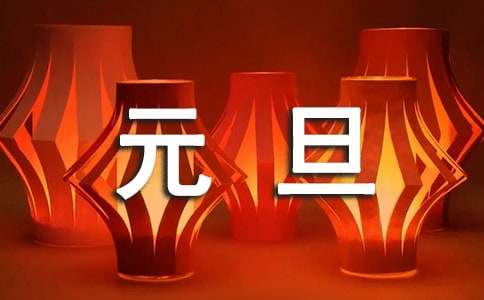元旦的英文介绍
关于元旦节大家了解多少呢?下面小编收集整理了元旦节的习俗介绍,欢迎大家阅读了解!

【元旦节习俗】
1. Kaisui(beginning of the year): According to the Chinese traditional custom, starting from haishi(9p.m. to 11p.m.)of the last evening of the twelfth lunar month, each family must prepare offering s to deities at the altar. At the same time, they too prepare food for the New Year day: The whole family will then stay awake together to attend to the year(called shou sui).
After haishi, zishi(11p.m. to 1a.m.)will come, and this is the arrival of New Year(Yuandan). At this moment, people begin the celebration with fireworks. Vegetarian and sweet foods will then be placed are the altar for offerings, and incense be burned to welcome the deities. In the ancient times, it was believed that haishi connected the two years and thus was called kaisui.
At the same night, some families will follow the instruction in Tongshu and place preparing altar in the direction of the "fortune deity" during the "fortune time" to receive the deity. If the direction of the "fortune deity" is at the "ill position", people will choose to receive "happy deity" or "noble deity" instead.
2. There is an apparent difference in the custom of food taking on Yuandan between the Chinese in the northern and southern regions. The northern Chinese has the habit of taking jiao zi(dumpling made of flour with vegetable and meat wrapped inside).
Some people may put a sweet or a coin inside jiao zi, hoping to have a sweet year after tasting the sweet and a wealthy year after tasting the coin. on the other hand, the southern Chinese have the taboo for killing on Yuandan.
Therefore, they do not take meat in tee morning of Yuandan, so as to avoid bloodshed or mutual slaughter. In order to evade misfortune, they have the first meal of this day without meat. Instead, they take vegetarian food for the sake of virtue.
3. What is special during the New Year is that parents or elders will distribute red packets(ang pao or ya sui qian)to the children. People in the ancient times were more particular in giving away the red packets: the distribution took place on the eve of New Year so that the kids could suppress the past year and enter the New Year.
Ya sui has the meaning of overcoming the unpredictable future. Representing the wishes for the healthy psychological growth of the children, ya sui qian symbolises the elders' hope to see their children overcome all the unpredictable elements brought by the "year".
【全球各地的元旦饮食习俗】
印度:饿肚子
印度人在新年这天实行禁食,从凌晨直到午夜止。过了午夜各家才品尝准备好的饭菜,互相祝贺新年。
法国:存酒喝光
法国人有一种迷信,认为除夕家中如有剩酒,来年会交厄运。只有干干净净,才能迎来一年的好日子。因此,他们宁可喝得酩酊大醉,也要将家中的酒喝个精光。
波兰:吃青菜
波兰少女在过新年时,要穿上特别的兔形衣服吃青菜,据说吃了青菜会事事顺心如意。
巴拉圭:不食烟火
南美洲的巴拉圭人将年终最后5天定为冷食日。这5天,上自国家元首,下至庶民百姓,都不动烟火,只吃冷食。新年零时钟声响后,才能开始点火烹煮佳肴,大摆宴席欢度新年。
马达加斯加:忌吃肉
在马达加斯加,新年以前7天时间内不准吃肉,要到除夕晚餐,方可吃些禽类。元旦这天,夫妇要向双方父母赠鸡尾,表示尊敬;向兄弟姐妹赠送鸡腿,表示关心和友谊。
奥地利:忌吃螃蟹
奥地利人过年在一起吃团圆饭时,绝对不准吃螃蟹。它们认为,螃蟹是横行的,谁要吃了它,就会给工作及家庭带来不幸。
越南:禁止喝汤
越南北方地区的一些少数民族,除夕夜要到平日取水的地方烧香、磕头,并打一桶水煮年饭。煮好后,先祭奠祖宗,然后全家吃年夜饭。吃这顿饭时,绝对禁止喝汤。他们认为,喝了汤,种下的庄稼就会受涝。
匈牙利:忌食飞禽
匈牙利人除夕之夜不吃禽类,因为他们认为吃鸡、鸭、鸽等飞禽,来年的幸运便会飞走。他们在新年送亲友的礼物,大都喜欢礼物上有打扫烟囱工人和小肥猪的图形,打扫烟囱工人当然是除旧的.象征,胖乎乎的小肥猪,令人喜欢,含意也喜庆。人们在形象上敬重小肥猪,但实际上又是另一回事了,因为他们新年的传统食品是油炸小乳猪,那是要拿小肥猪开刀的!
保加利亚:打喷嚏得牛羊
你若在保加利亚人家里吃年饭,一定要打喷嚏,这样会得到意想不到的好处。当地习俗认为,第一个打喷嚏的人会给全家带来一年的幸福。于是主人走向自己的农场,将自己首先看到的第一只羊,第一头小牛,或第一匹马驹牵过来,送给第一个打喷嚏的客人,这个喷嚏打得有多值!
比利时:向动物拜年
在比利时农村,元旦的早晨,人们起床后都跑到牛、羊、马、狗、猫等动物的身边,向它们拜年。动物是人类的朋友,一年来,动物们辛苦了,所以要向它们拜年,祝它们新年快乐!
巴基斯坦:涂红过新年
巴基斯坦人过年出门时,都带着一个红粉包,碰到好朋友,就在他脸上涂红粉。年轻人还带着有红水的玩具枪,在街上互相追呀跑呀,射出红水,因为他们认为红色表示吉祥如意,这一年你会过得很快活噢!
西班牙:过新年吃葡萄
在新年的前一天晚上,西班牙人都聚集在广场上,每人手里拿一串葡萄。当钟调敲了12下,新年到来时,人们就吃12颗葡萄,表示这一年的每个月都会过得很幸福。
【元旦的英文介绍】相关文章:
元旦英文介绍11-10
元旦的习俗英文介绍11-08
元旦中英文介绍11-10
元旦节英文介绍11-13
中国节日元旦英文介绍11-10
元旦英文介绍加中文翻译11-08
元旦的英文11-13
元旦的英文资料11-13
庆祝元旦的英文11-13